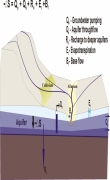/topics/climate-and-weather
Climate and Weather
Floods, Rains News Roundup (16-23 September 2010)
Posted on 24 Sep, 2010 10:45 AMReports of floods, swelling of rivers continue from various parts of North India such as Delhi, Punjab, Haryana, Chandigarh, Bihar, Uttar Pradesh, Uttarakhand. There have been reports of landslides in the Himalayas, Himachal Pradesh, especially Shimla where the tourism industry has suffered and tourists have been reported to be stranded because of floods and landslides. Uttar Pradesh and Uttarakhand have been the worst hit with a high number of deaths due to monsoon and floods.
"Andhra's mammoth water harvesting program - 'Jalayagnam', sinks" : News roundup (16-23 September 2010)
Posted on 24 Sep, 2010 10:29 AMAgriculture/Watershed Development
Visualizing Bangalore temperature
Posted on 23 Sep, 2010 11:22 AMI was going through weather data exposed by India Water Portal and I was thinking about an interesting application which would show my love to Bangalore. The best part of Bangalore is its temperature, rains and clouds. So I wrote this small app which uses the data provided by India Water Portal (which in turn is by CRU). IWP has data for all the districts in India, for every month and for multiple parameters. They have data for 100 years. It quite an amount of data to play with if you are interested. They have an easy way of filtering and downloading.
Parsing and visualizing Indian flood forecast
Posted on 23 Sep, 2010 11:09 AMFlood forecast alerts are provided by Central Water Commission. They have boring maps and tables. Also they don’t provide data in program accessible format. Members of ICTD for asia are working on parsing and storing that data. In the meantime I wanted something to play. I found ScraperWiki (hacker news discussion) which can be used to scrape data from any page and schedule it for running. It allows php, python and ruby languages. Its easy and gives lot more flexibility than Y! pipes to scrape that data. Here is my scraper to get the flood data. You will have to register to get an API to use the data. Data is available in JSON, XML, PHP etc.
Notes on rainfall data visualization of Karnataka
Posted on 23 Sep, 2010 10:51 AMAfter watching “developing world” video on TED, I was eager to try out Google visualization API. When I found the rain fall information, I thought its the best suited data to play around. Go check out the Visualization of Rain Fall in Karnataka.
Rural development - Mid-term appraisal of the eleventh five year plan - Report by the Planning Commission
Posted on 22 Sep, 2010 06:16 PMThe Eleventh Plan (2007-08 to 2011-12) sought to build on the gains achieved in the Tenth Plan and shift the economy to a path of faster and more inclusive growth. The Mid Term Appraisal (MTA) report for the Eleventh Five Year Plan 2007-2012 by the Planning Commission reviews the experience in the first three years of the Plan and seeks to identify areas where corrective steps may be needed.
National Symposium on "Sustainable Rice Production System under Changed Climate", ARRW, Cuttack
Posted on 22 Sep, 2010 11:06 AM![]()
Organizers:
TheWater Channel news flash - Video contest
Posted on 22 Sep, 2010 10:34 AM
We are proud to announce the video contest "Water, Climate and.....Action!"
Water, Climate and…..Action! Enter your short film in the contest!
India’s groundwater typologies – A presentation by ACWADAM
Posted on 22 Sep, 2010 08:01 AMThis presentation by ACWADAM deals with groundwater typologies in India. The typology of groundwater can be defined in many ways based on a) Uses of Groundwater, b) Geography, c) Geology, d) Hydrogeology (Aquifers), e) Groundwater Quality, f) Stage of Groundwater Development, and g) Socio-ecology of Groundwater.
Groundwater balance – A presentation by ACWADAM
Posted on 21 Sep, 2010 10:00 PM This presentation by ACWADAM deals with the subject of groundwater balance. It begins by describing the skeleton for the water balance equation viz., ground surface, soil, aquifer and bed rock. It describes the processes subsequent to rainfall such as interception, initial detention, depression storage, infiltration, runoff, streamflow, soil moisture retention and recharge.
This presentation by ACWADAM deals with the subject of groundwater balance. It begins by describing the skeleton for the water balance equation viz., ground surface, soil, aquifer and bed rock. It describes the processes subsequent to rainfall such as interception, initial detention, depression storage, infiltration, runoff, streamflow, soil moisture retention and recharge.
The watershed water balance equation is explained in terms of input (rainfall and water transfers) and output (runoff, evapotranspiration and infiltration). It notes that the input to a generalized water balance is rainfall whereas the input to a groundwater balance is infiltration. The difference between infiltration & recharge, natural & artificial recharge and interflow & discharge are explained thereafter. The water balance for an aquifer may vary, depending upon the nature of groundwater system –
- Watershed with a deep aquifer
- Watershed has both shallow and deep aquifers
- Watershed has only shallow aquifer





